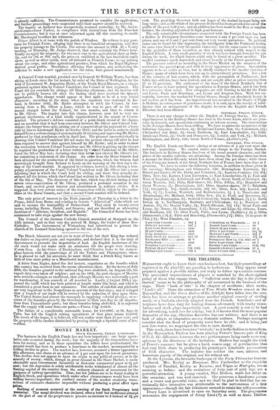A General Court-martial, presided over by General Sir William Warre,
has been sitting at Leeds since the 1st instant, by order of the Duke of Wellington, for the trial of Lieutenant W. Augustine Hyder, of the Tenth Royal Hussars, on a charge preferred against him by Colonel Vandeleur, the Colonel of that regiment. The Court did not conclude its sittings till Thursday afternoon; and its decision will not be publicly known till after the finding shall have received the Queen's approbation. The charge would appear at first sight to be of a very trivial character: according to the story, when the regiment was stationed in Ire- land, in October 1842, Mr. Hyder attempted to trick his Colonel, by bor- rowing from a Mr. Oliver a horse, which be was to pass off as his own second charger before the Colonel, for two months, and then to return it to Mr. Oliver. The inquiry into this charge, however, soon led to very im- portant disclosures, of a kind totally unprecedented in the annals of Courts- martial. The prisoner's defence consisted of a point-blank denial of the charge, and an assertion that it had been concocted between Mr. Oliver and Colonel Van delenr; the former from spite, arising out of a quarrel about the payment for a horse sold by him to Lieutenant Ryder in October 1842; and the latter in order to shield himself from a serious charge of systematically ill-treating and oppressing Mr. Hyder, preferred by that gentleman early in April last. The prisoner succeeded clearly in showing that Colonel Vandeleur did not make the present charge till after he had been required to answer that against himself by Mr. Hyder; and in order to show the connexion between Colonel Vandeleur and Mr. Oliver in getting up the charge he required the production of a letter written by Colenel Vandeleur to Mr. Oliver, dated the 9th of May last; declaring that that letter had elicited Mr. Oliver's let- ter containing a statement of the charge. An order from the Horse Guards had been obtained for the production of the letter in question, which the witness had accordingly brought from Ireland to Leeds on the morning of the first day's sit- ting of the Court-martial. It appeared in evidence, however, that during a tem- porary adjournment of the Court, Colonel Vandeleur took Mr. Oliver into a room adjoining that in which the Court held its sitting, and there they actually de- stroyed all the letters which the Colonel had written to Mr. Oliver, including that of the 9th of May. The discovery of this fact, which was elicited during is very severe cross-examination of Mr. Oliver, produced a profound sensation in the Court, and excited great interest and astonishment in military circles. It is supposed that very serious notice of the transaction will be taken by the autho- rities at the Horse Guards, and that a second Court-martial will be ordered.


























 Previous page
Previous page